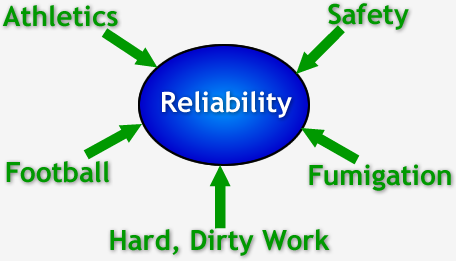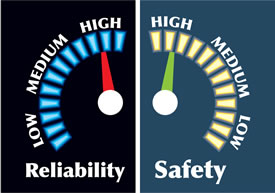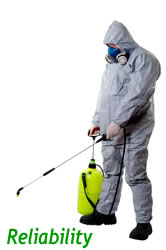Treat Reliability Like …

This blog outlines ways to think about reliability to help drive a culture of continuous improvement. It is the fourth in a series of Blogs on improving plant reliability performance through changes in culture, programs, equipment design, maintenance and operation.
The principles we applied in implementing successful reliability programs in a number of operating plants included the following:
- Treat Reliability like Safety
- Treat Reliability like Football
- Treat Reliability like Athletics
- Treat Reliability like Fumigation
- Treat Reliability like Hard, Dirty Work
Treat Reliability Like Safety
 In most operating plants, there is a reasonable safety culture and program. This is driven by regulatory requirements and also a desire to have a safe, injury free workplace. The safety program includes management reporting at a high level in the plant structure, a well written manual describing hazards and procedures, tests and inspections to be done prior to executing work, a well-defined incident investigation process and metrics to report performance. There is generally a culture that everyone is involved in safety and 100% compliance with rules is a condition of employment. In many plants, safety information is posted in the workplace and metrics are often displayed at the front gate. These metrics can include recordable incident rate, days since last incident and hours worked since last lost time injury. Safety performance, near misses and investigations are reviewed at the highest level in the plant on a set schedule.
In most operating plants, there is a reasonable safety culture and program. This is driven by regulatory requirements and also a desire to have a safe, injury free workplace. The safety program includes management reporting at a high level in the plant structure, a well written manual describing hazards and procedures, tests and inspections to be done prior to executing work, a well-defined incident investigation process and metrics to report performance. There is generally a culture that everyone is involved in safety and 100% compliance with rules is a condition of employment. In many plants, safety information is posted in the workplace and metrics are often displayed at the front gate. These metrics can include recordable incident rate, days since last incident and hours worked since last lost time injury. Safety performance, near misses and investigations are reviewed at the highest level in the plant on a set schedule.
Unfortunately, in many plants this level of discipline is not applied on the reliability side. This can impact both personal and process safety as well as plant financial performance. The reliability supervisor, if there is one in the plant, is often buried in the organizational structure and the reliability department can become more of a maintenance support organization rather than driving and leading reliability improvement. We also find that reliability can be regarded as the reliability supervisor’s sole responsibility in contrast to safety where everyone is responsible for performance.
It is recommended the plant evaluate all of the elements needed for a strong safety program including procedures, tests and inspections, manpower, metrics and the process to deviate from standard procedures. Then a comparison should be made to see if similar elements are in place for reliability. An effort should be made to have all personnel understand they can impact plant reliability as they impact safety. This includes not only operations, maintenance and engineering staff but also the leadership team, procurement, contractors, vendors, security, lab and others. In addition, reliability performance should be posted in control rooms and offices and reliability should be part of the lunchbox and other discussions.
Treat Reliability Like Football
 When we look at the game of football we find there are elements and principles that can carry over to plant reliability programs. First, this is a team sport and an individual cannot be successful without the support of every other member of the team. Of course, the team has a leader or Quarterback who provides strategic direction but this person cannot be successful without the other personnel working together and executing their jobs. Football also relies on blocking and tackling. In the reliability program this means basic elements such as up to date drawings, equipment lists and procedures must be in place and followed every day. There are also some jobs on the team that are not glamorous but must be executed perfectly for the team to win. This might be compared to the work an inspector performs. This can be a routine job but must be executed perfectly to identify upcoming issues in the plant. Finally, we know that to win games the team must be engaged for 60 minutes. Letting down your guard for a moment can result in disaster for the team. Likewise, in plant reliability continuous attention to detail is needed.
When we look at the game of football we find there are elements and principles that can carry over to plant reliability programs. First, this is a team sport and an individual cannot be successful without the support of every other member of the team. Of course, the team has a leader or Quarterback who provides strategic direction but this person cannot be successful without the other personnel working together and executing their jobs. Football also relies on blocking and tackling. In the reliability program this means basic elements such as up to date drawings, equipment lists and procedures must be in place and followed every day. There are also some jobs on the team that are not glamorous but must be executed perfectly for the team to win. This might be compared to the work an inspector performs. This can be a routine job but must be executed perfectly to identify upcoming issues in the plant. Finally, we know that to win games the team must be engaged for 60 minutes. Letting down your guard for a moment can result in disaster for the team. Likewise, in plant reliability continuous attention to detail is needed.
Treat Reliability Like Athletics
Athletics and reliability have a lot in common. Everyone wants to be a champion, however just wanting to be a champion probably won’t get you to the podium. In some plants we find management dictates reliability improvement metrics, but without the right programs and personnel  in place this is seldom achieved. Successful athletes have significant experience, train hard and rely on skill vs. luck to achieve their goals. Athletes also benchmark their competition to determine exactly what is world class performance. It takes a long time, exceptional dedication and appropriate skills to become a champion athlete. The same is true in reliability. There are no shortcuts or “reliability switch” to make the plant run better.
in place this is seldom achieved. Successful athletes have significant experience, train hard and rely on skill vs. luck to achieve their goals. Athletes also benchmark their competition to determine exactly what is world class performance. It takes a long time, exceptional dedication and appropriate skills to become a champion athlete. The same is true in reliability. There are no shortcuts or “reliability switch” to make the plant run better.
Treat Reliability Like Fumigation

Fumigation is often required to rid our homes and offices of bugs, especially if we live in the humid Gulf Coast where there are many refining and petrochemical operations. The best approach is to be proactive and apply treatment before the bugs appear. This is also true in reliability. We must maintain vigilance in our programs and constantly be alert for new bugs creeping into our operations. Many times, management thinks it’s a waste of money to maintain records, perform proactive inspections, monitor lube oil quality and take vibration readings. However, if we let these basic programs slide, bugs will infest our operations and eventually become an overwhelming problem. It’s better to maintain strong programs and vigilance in our operations, and keep a fly swatter handy for the occasional bug which can be easily eliminated.
Treat Reliability Like Hard, Dirty Work
 Many of the things we do to maintain our reliability programs are not glamorous. These include exactly following procedures, closing out work orders, maintaining up to date as built records, performing inspections and tests, executing operator rounds and adhering to engineering standards. Plants that do this are generally calm and under control. People have time to work on continuous improvement rather than fire-fighting. It takes time and effort to drive this culture and insist on doing things right. This job never ends and entropy is always trying to let things slide to a lower state. This can happen over time and eventually it is nearly impossible to recover since it is very expensive to catch up on inspections, determine what is really in the field and recreate “as built” conditions. Discipline from the beginning is required. It’s also the law for PSM covered processes.
Many of the things we do to maintain our reliability programs are not glamorous. These include exactly following procedures, closing out work orders, maintaining up to date as built records, performing inspections and tests, executing operator rounds and adhering to engineering standards. Plants that do this are generally calm and under control. People have time to work on continuous improvement rather than fire-fighting. It takes time and effort to drive this culture and insist on doing things right. This job never ends and entropy is always trying to let things slide to a lower state. This can happen over time and eventually it is nearly impossible to recover since it is very expensive to catch up on inspections, determine what is really in the field and recreate “as built” conditions. Discipline from the beginning is required. It’s also the law for PSM covered processes.
Becht Engineering can help evaluate the conditions in your plant and help drive the systems and culture to improve reliability. We have over 1300 experts in the refining, nuclear and petrochemical industries. Most of them are from owner organizations and have 30 plus years of experience.
Let us know if we can help by contacting us at Becht.com.
Have a question or would like more information? You may post to this blog (below) or click the link below for more help.




